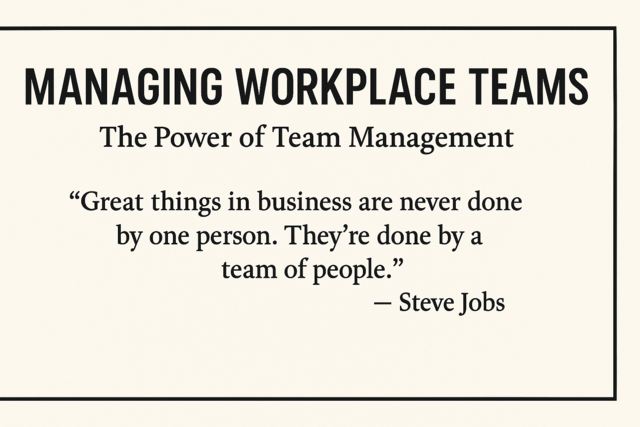Team Management and Leadership
Unite, Inspire, Achieve: Master Team Leadership

10 Hours average completion time
1.0 CEUs
15 Lessons
21 Exams & Assignments
5 Discussions
15 Videos
32 Reference Files
Mobile Friendly
Last Updated January 2026
Unleash the transformative leader within you as you embark on this enthralling journey through the maze of team management and leadership. Designed meticulously for the aspiring changemakers of tomorrow, this course promises to mold you into the beacon of inspiration and guidance that every team craves.
We initiate our exploration by demystifying the intricate dance between the roles of manager and leader. Drawing insights from trailblazers of yesteryears to the visionaries of today, we dissect leadership theories and styles that have shaped world history and continue to influence contemporary thought.
Emotional intelligence isn't just a buzzword; it's the bedrock of impactful leadership. Delve deep into the facets of high EQ and understand how it elevates one's leadership prowess. Walk with us through the labyrinth of talent acquisition, nurturing them from their first steps in your organization, instilling your company's ethos, fostering camaraderie, and sculpting their professional prowess.
Leadership is as much about the subtleties as it is about the broad strokes. We dive into the core skills that forge an exceptional leader: articulate communication, adept delegation, proficient management, and the finesse of coaching. And as we traverse through the course, we shed light on the art of steering a team through tumultuous times and transitions, showcasing the resilience and adaptability every leader should arm themselves with.
The modern world demands versatility. Hence, we culminate our journey by contrasting the dynamics of managing remote teams versus on-site brigades, ensuring you're equipped to lead in any scenario.
Emerging from this course, you won't just be another manager; you'll be a symbol of innovation, vision, and strength. Whether you're stepping into the leadership arena for the first time or honing your skills further, this course promises to elevate your leadership narrative, crafting a legacy of excellence and innovation. Are you ready to shape the future? Your odyssey to legendary leadership begins now.
- Leadership and management distinction
- Innovative problem-solving abilities
- Art of delegation
- Hiring and onboarding proficiency
- Adaptable and resilient mindset
- Emotional intelligence and leadership development
- Crafting inclusive team environments
- Building trust and team loyalty
- Effective communication and active listening
-

Business Credit 101
-

Business Administration 101
-

HR Compensation and Benefits
-

Ultimate Secretary Training Bundle
-

Delegation Skills
-

Job Performance Appraisals - A How To Guide
-

Successfully Networking Your Career
-

Business Analysis
-

Personal Protective Equipment
-

Accounting Level 3: Financial Planning
-

Behind the Paycheck: Mastering Payroll Systems
-

Innovative Thinking Skills
-

Financial Analysis 101: Planning and Control
-

Leadership Skills for Managers
-

Management Essentials
-

Managing Workplace Teams
-

Leadership and Supervision
-

Creating and Managing a Non-Profit Organization